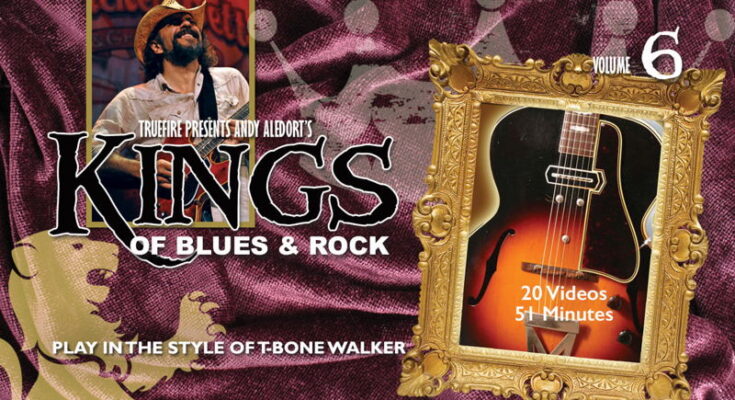Kings of Blues & Rock Vol. 6 Tutorial
7 Feb 2022 | 396 MB
Examine the blues guitar style and soloing techniques of T-Bone Walker
Kings of Blues & Rock examines the playing styles of eight of the greatest and most influential blues and rock guitarists that have ever lived: Eric Clapton, Duane Allman, Jimmy Page, Johnny Winter, T-Bone Walker, B. B. King, Albert King and Freddie King. Kings of Blues & Rock is presented in eight Volumes, one volume for each artist.
This volume of video guitar lessons examines the playing style of T-Bone Walker. Born in 1910, T-Bone is universally regarded as the father of the electric blues guitar. He learned about blues guitar directly from two blues giants, Blind Lemon Jefferson and Leadbelly. He was one of the genre’s first electric players, and claimed that he got his first electric guitar as early as 1935. His 1947 recordings of his compositions “Call it Stormy Monday” and “T-Bone Shuffle” are among the most important and most influential blues recordings ever made, and have since become “standards” for all blues and blues/rock guitarists.
With his amplified electric offering greater volume and sustain, T-Bone was able to emulate the solo lines of saxophones and other horn players in his flatpicked single-note solos. T-Bone was one of the first guitarists to use string-bending as a major component in his approach, which was a prime influence on B.B. King, who has stated that it was T-Bone’s solos that made him want to play blues guitar. He also was a virtuoso soloist, spinning out fast and complex jazz-like lines using alternate picking much of the time.
Kings of Blues & Rock will impact your playing in two distinctly different but equally important ways: first, you will learn how to play guitar in the style of T-Bone Walker; more importantly, you will be able to take this information and use it to create your own style and sound in rock and blues guitar.
The playing styles of each artist is examined in a variety of musical settings designed around the artists’ signature style and performances. All of the solo segments are played first at tempo, over practice rhythm tracks, and then presented slowly with thorough explanations. Practice rhythm tracks are provided so that you can practice the solo examples as presented and work on creating your own solo variations and ideas. Also discussed is the type of guitar and amp each artist favors, and the means by which they achieve their distinct, signature sound.




